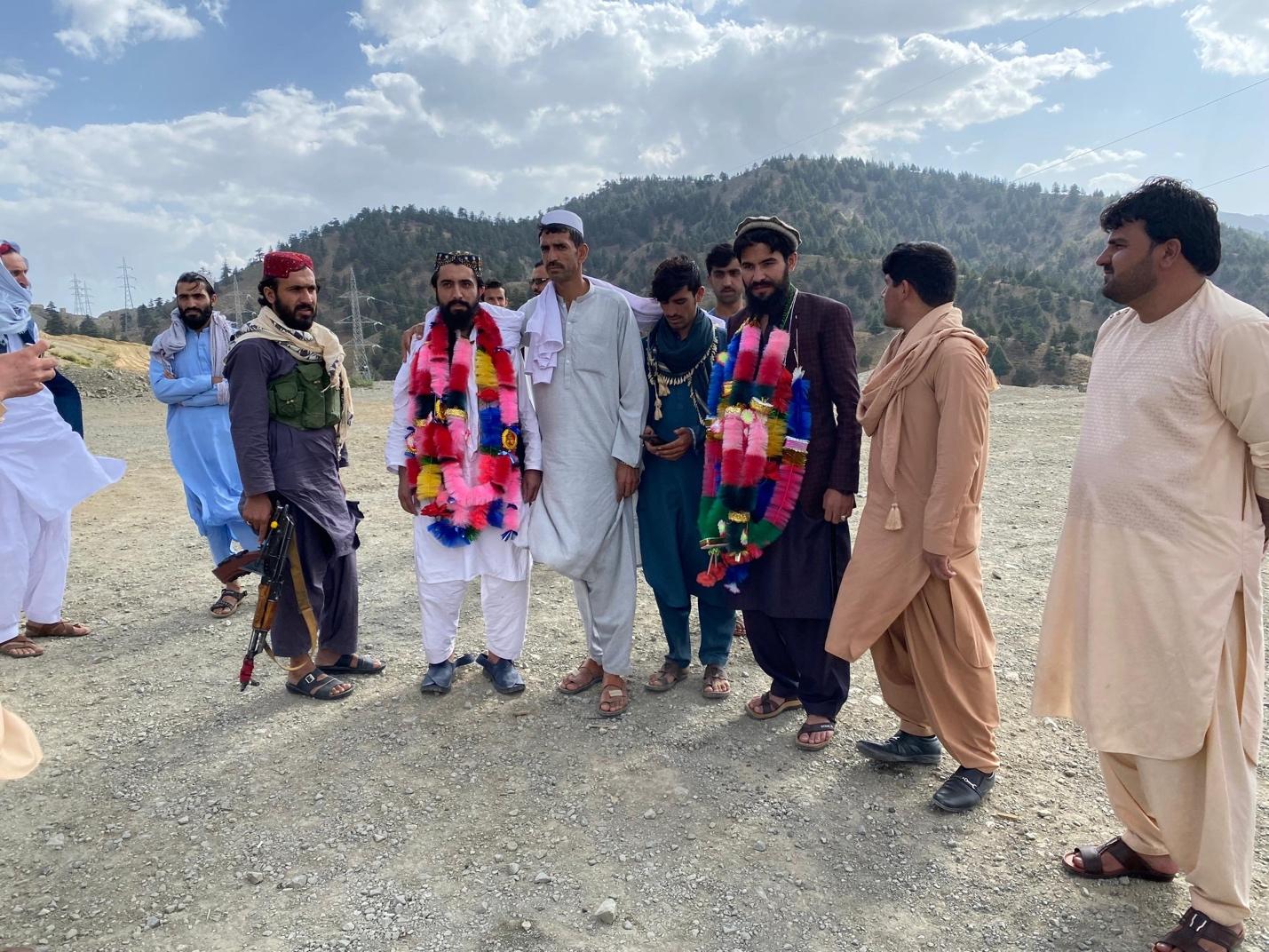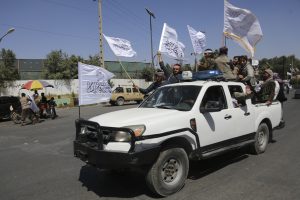The Poet
In a discreet corner of Kabul, an Afghan writer hides from the Taliban in plain sight. His hair, which falls past his shoulders, and his once-dark skin, which has taken on a pale hue, confirm that he has not seen the light of day for some time. Previously a staunch critic of the Taliban, Sayed (a pseudonym) has not stepped outside his house since August 15, 2021 – the day the Afghan government collapsed.
After fighting a two-decade-long war, the Taliban took over the country, and “it feels as though the entire history of Afghanistan is being swept away by a tsunami,” the poet confides.
His room, a small space some 2 meters in length and 1.5 meters in width, is decorated with books, a bunch of papers, and a working table. A single window serves as his only connection to the outside world. Through it, Sayed watches the interplay of light and shadow as the tree outside and the sun create ever-changing patterns on the wall opposite his window.
“At times, I keep watching the shapes the sunlight creates on the wall and the change of seasons,” Sayed reflects. “It is all a spectacular view. My window does not change – only the shades change as the seasons do.”
Occasionally, he listens to the radio, taking notes for a historical account he hopes to write when the Taliban rule – what he calls the darkest chapter in Afghan history – is over. Despite his calm demeanor, he still vividly remembers the fear of August 15, 2021.
“Somewhere in my heart, I cling to the hope that the government might survive,” he ruminates. “But as night descends, I accept that we are facing one of the greatest catastrophes of all time.”
Despite the heartache, Sayed was not surprised as districts and provincial capitals fell to the Taliban one after another, with Kabul quickly following. He anticipated the government’s downfall long before that fateful day.
During a 2008 trip to Brussels, he met with top coalition generals at NATO headquarters to share the perspective of young Afghans, warning them about the fragility of Afghanistan’s future. He told the generals that he foresaw the potential collapse that came years later. His honesty angered some of them.
Sayed presented a list of 13 issues during the meeting, the most prominent of which was the oversight of Pakistan’s extensive support for the Taliban. He contended that coalition forces disregarded pleas from President Hamid Karzai, who emphasized that Pakistan hosted the Taliban and provided them with the resources necessary to wage war against both coalition forces and the Afghan government. Nevertheless, Pakistan officially remained a key ally in the fight against terrorism in Afghanistan.
Sayed points out that, three years later, in 2011, al-Qaida leader Osama bin Laden was discovered in Pakistan. This, he argues, served as proof that coalition forces were engaged in combat in the wrong location – Pakistan, not Afghanistan, should have been their focus.
In that 2008 meeting, Sayed pointed to other mistakes made by the coalition. He believes that too much power was placed in the hands of warlords, rather than in those of the Afghan government. That created a parallel force that ultimately undermined the government and challenged the rule of law.
Additionally, he noted that the U.S.-led coalition often failed to consider Afghan traditions and cultural sensitivities, particularly during house searches, night raids, and bombardments – actions that were frequently later deemed “mistakes.” He asserted that these missteps only served to strengthen the Taliban’s anti-U.S. stance and foster additional animosity.
Now, as Sayed endures life under Taliban rule, he remains adamant in his belief that the Taliban will not change. “I refuse to believe the international community when they tell us that the Taliban have changed their ways,” he says with conviction. “They won’t change, and the world will eventually come to the point where it says, ‘enough is enough.’”
Until then, he has to survive with the little that his wife is able to earn as a tailor and cling to hope, something that he refuses to lose – even during the terrifying moment when Taliban security personnel in March 2022 searched his neighborhood, knocking on his neighbor’s door. “My wife cried, thinking that it was over for me,” he recalls.
Despite the fear, when most Afghans were seeking a way to leave, he decided to stay. He refuses to leave his country.
As the Afghan writer remains confined within the walls of his small room, haunted by the memories of a lost nation and a government that once held his hopes, the outside world continues to shift in profound ways.
As Sayed watches the changing patterns of light and shadow on his wall, Afghanistan itself is now caught in the stark contrast between past dreams and present realities.
The Fighter
While Sayed is trapped behind his window, but off from the broader landscape of Afghanistan, there are those who view the Taliban’s return not as a catastrophe but as a long-awaited homecoming. Khalid Zadran is one of them.
Zadran’s journey back to his homeland, after years of exile and conflict, represents a starkly different chapter in the same story – the story of a nation grappling with the consequences of decades of war, where liberation for some becomes a nightmare for others.
Zadran, the spokesperson for the Kabul police under the Taliban’s Islamic Emirate, is often seen in uniform, giving media interviews. He maintains an active social media presence. Occasionally, he shows off his friendship with Anas Haqqani, the son of Jalaluddin Haqqani – the founder of the Haqqani Network – who was also a member of the Taliban’s negotiation team at its political office in Doha, Qatar.
Zadran fought against the Afghan government and the U.S.-led coalition in various regions for over a decade until he was injured and sought treatment in Peshawar, Pakistan. As districts began falling to the Taliban in the lead-up to the pivotal moment, he was eager to return.
“I just wanted to come back to my homeland, to a free country, and go home. I wanted to be free and walk in my own village. I no longer wanted to fight,” he recalls. “I had cut my hair and dressed nicely. Finally, the day I had been waiting for fourteen years had arrived.”
He arrived in Nangarhar province, approximately 193 kilometers east of the Afghan capital.
“On the way to Kabul, I took a taxi, sat in the car, and started crying. I felt like kissing the taxi in gratitude. I cannot describe how much I enjoyed my first meal in Kabul. Later, I realized that I hadn’t slept for several nights.”
However, his journey was far from over. He still had to travel to his hometown in Khost province, a three- to four-hour drive from Kabul, where he would reunite with his mother after many years. Upon his arrival, villagers came out to greet him with flowers.
“The most unbelievable moment was seeing my mother,” he recalls. “I had finally arrived home after 14 years. I cannot describe how I felt when I hugged her. We both cried.”
“She was now frail and older,” he adds.
He also met his sisters and other women from the neighborhood who had known him since he was a child, and now gathered at his parent’s house to meet and greet him after nearly a decade and a half.

Khalid Zadran, dressed in brown, stands among local villagers who warmly welcome him back to his hometown.
Zadran’s family originally hailed from Khost province, and their elders, like thousands of Afghans, migrated to Pakistan following the Soviet invasion of Afghanistan in the 1970s.
They settled in Waziristan, just across the Durand Line, close to Khost. The mountainous region of Waziristan played a significant historical role in the fight against the Soviets, serving as a sanctuary for many Mujahideen who later became affiliated with the Haqqani Network, which maintained close ties with al-Qaida during the conflict. After their victory in the jihad, the Haqqani group largely retreated to their stronghold, avoiding involvement in the subsequent Kabul Civil War and remaining mostly inactive on the battlefield.
Thus, Zadran was born in Waziristan in 1992.
His family returned to Afghanistan in 2001, following the fall of the first Taliban regime and the takeover by U.S.-led coalition forces. Like many other children, he attended school, frequented the local mosque, and enjoyed time with his friends. However, as time passed, Zadran says, he began noticing injustices against the Afghan people, such as bombs being dropped on weddings and funerals, house searches that violated local customs, and night raids that infringed upon the sovereignty of a land for which his elders had fought.
The increasing number of civilian deaths from U.S. and coalition airstrikes and night raids fueled growing resentment against the presence of foreign troops and created adversaries. These were mistakes that could have been easily avoided, but paved way for the collapse of the government in the early stages of the U.S.-led war in Afghanistan, for example, in December 2001, an airstrike on a wedding party in Paktia province, bordering Khost, created panic among Afghans. Villagers reported to the media that over 100 civilians were killed. This and subsequent atrocities had a profound impact on public opinion of the U.S. occupation.
In 2008, it was the Haska Mena wedding raid. A U.S. air strike reportedly killed around 50 civilians in the east of the country, according to Afghan authorities. U.S. forces claimed they targeted insurgents in the strike, with a statement asserting that “any loss of innocent life is tragic.” The same year, another airstrike hit a wedding party in Shah Wali Kot district of Kandahar province. In that incident, coalition forces killed 40 civilians and wounded about 28.
The Afghan government eventually realized that the growing anger was alienating locals from the government. At one point, then-President Hamid Karzai called on U.S. President-elect Barack Obama to prioritize the prevention of civilian casualties.
It did not take long for Zadran to become an adversary. He came under suspicion from Afghan government security forces in 2008 after one of his friends was arrested for planting a landmine. At just 16 years old, he left school. Aware of his family’s history of fighting against the Soviet invasion, he knew the route back to Waziristan, where he could regroup and join the Taliban as a fighter.
What drove Zadran to continue fighting was the desire to end the foreign presence and what he describes as the suffering of his people. For him, August 15 marked the realization of this dream. He aims to write a book telling the story of his journey from a young boy to a Taliban fighter.

Obaidullah Baheer giving a lecture titled “Peace Midst the Chaos: The Internal Journey” three years ago, at TEDxDarulaman, the Afghanistan version of TEDxTalks.
The Scholar
As Zadran celebrates his return home, and Sayed remains confined within the four walls of his small room, both are confronted with a nation in turmoil – a nation where dreams of freedom and the reality of enduring conflict coexist in an uneasy balance. The stories of both men reveal the complex and deeply personal nature of Afghanistan’s conflict. Whether it is the hope of a new beginning or the despair of a lost homeland, each Afghan’s journey reveals a different facet of the nation’s complex and turbulent history.
In this intricate landscape, Obaidullah Baheer, a dedicated educator who teaches the course “Civic Engagement and Thinking about Democracy” at the American University of Afghanistan, finds himself at a pivotal crossroads, much like his country.
After completing much of his education abroad, Baheer made the momentous decision to return to Afghanistan in 2018 and teach.
His courses, once vibrant and brimming with energy, are now relegated to online as the American University of Afghanistan remains shuttered, much like the U.S. Embassy and the representation of the international community after the collapse of the Afghan government.
He admits that the fall of the Afghan government on August 15, and the ensuing transition to a new reality was overwhelming, and fearful. But for Baheer, his only recourse was to persevere, continuing to engage with his students and youth from all walks of life. He believes that collective action could spark lasting change and foster peace in a nation desperately seeking stability.
The Taliban’s declaration of general amnesty, he says, represents a critical juncture for Afghanistan, where the past and present converge. However, ongoing reports of human rights abuses cast a shadow over this declaration.
Undeterred, Baheer remains steadfast in his belief in the power of collective action to mobilize an intellectually driven populace capable of holding the Taliban accountable. With Afghanistan under sanctions and no country formally recognizing the Taliban government, Baheer sees the potential for internal change – and eventually a nation where Afghans like Zadran and Sayed can meet without fear and work toward progress.
The 34-year-old intellectual acknowledges that bridging the two far ends of the Afghan tragedy – the fighter and the poet – is a long journey that will not be easy and will require time and resilience. Baheer emphasizes the need for communal work and organized action. Global sanctions and isolation from the international community do not contribute positively to that effort. Instead, they often exacerbate the suffering of ordinary people while failing to hold regimes effectively accountable.
Afghanistan’s story since the Taliban returned to power is not a simple narrative, as the experiences of these three Afghans show. For some, it was the beginning of a waking nightmare; for others, it was a dream come true. Perhaps even more Afghans share Baheer’s outlook: troubled by the current reality but still nurturing a fragile hope for a better future – one that makes room for Taliban supporters and critics alike.
Afghanistan has endured decades of conflict, and the prospect of renewed violence is a fear shared by many. In such a scenario, reconciliation and stability become the only viable path forward.

































